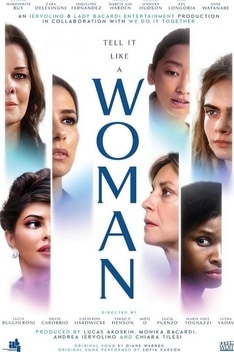Tell It Like a Woman – Snapshot
Tell It Like a Woman is a compendium of live action (and one animated) shorts, each by a different team. The writers, directors and main characters are all women from around the world. The themes are about the issues and unique problems that women face and how they’ve dealt with them. Not exactly a “movie” in the traditional sense, it isn’t going to work for everyone. (3.5*)
Where to Watch:
Stream: Prime/Pluto/Tubi/Roku/Peacock/Plex
Rent: Apple/Vudu ($5)
Tell It Like a Woman – The Oscar Buzz
Oscar Nominations:
Original Song (“Applause”, Diane Warren)
Tell It Like a Woman received a single minor nomination for the original song “Applause” – music and lyrics by Diane Warren, performed by Sofia Carson. People familiar with my reviews know this category is far from my favorite, largely because the songs are usually nominated more for their big- name artist creator or performer, and usually appear in the credits, rather than forming an integral part of the film. This song does appear in the credits and also at the end of one of the film’s segments. The song is fine and reflects the themes of the movie. (Still, it is a weird category.)
Shining a spotlight on younger and lesser known creative women around the world and in the U.S., there isn’t a whole lot of Oscar connections in this movie. Taraji P. Henson, who directs her first effort in the Pepcy and Kim segment, was nominated for Suipporting Actress in The Curious Case of Benjamin Button (08). Composer A. R. Rahman, for the Sharing a Ride segment, was nominated for his score and a song in 127 Hours, and won the Score and Original Song Oscar for Slumdog Millionaire (08). Editor Anne-Sophie Bion received a nomination for Film Editing for her work on The Artist. Actress Marcia Gay Harden, in the Elbows Deep segment, was nominated in the Supporting Actress category for Mystic River (03), and won the Oscar for her supporting work in Pollock (00). Jennifer Hudson, in the Kim and Pepcy segment, won the Supporting Actress Oscar for Dreamgirls (06).
Tell It Like a Woman – The Movie’s Family Tree
The Following Movies Share Talent with This One (and if you like these films, you might like this one):
Prisoner’s Daughter (22) : Director/Writer (Hardwicke); Composer (Rahman); Editor (Bion); Costumes (France)
Tell It Like a Woman is a compendium of seven shorts written and directed by women from around the world and featuring women in provocative settings that highlight some of the issues and problems unique to women in their daily lives. Aside from that general theme, there is nothing that connects these vignettes and so, in essence, this “movie” doesn’t really fit in the mold that my review format is designed for. Unfortunately, I don’t have the time and energy to research each of these seven productions with the depth of analysis that I do with a standard movie. In short, I have too many threads here to try and establish shared works. I listed one of them that seemed to pop out from multiple resumes, although I haven’t seen that film.
Tell It Like a Woman – What Others Think
Possibly because it is really a collection of shorts, Tell It Like a Woman does not register with the viewing public nor critics like a regular movie does. When the Oscars were first announced, the “movie” had one of the highest ratings from viewers of any of the 39 nominated films. But this week, when I went back to study the film, I discovered that IMDB, for one, had suddenly dropped the viewer rating to a 3.7 (based on only 10 ratings!), the lowest rating I have ever seen for an Oscar-nominated movie. It was also listed in the Action genre for no good reason and the parental guidance, supplied by a single reviewer, listed “severe” sex and violence, which is patently false. Furthermore, there were no reviews by any of my standard go-tos in the movie review business and absolutely no mention of it except in listings of nominees, even in the New York Times. It’s almost like the film simply dropped off of everyone’s radar. I suspect it is because it is a very difficult film to review if you don’t break it into its seven parts and, well, that’s a fair amount of work!
Tell It Like a Woman – Special Mention
We Do It Together – Tell It Like a Woman is a production of an organization called We Do It Together (wedoittogether.org), a 501(C) charitable organization founded by Chiara Tilese in 2015. It was organized to promote film production focusing on empowering women. The website has lots of material about the relatively small role that women play in the film industry with ideas and commitments to expand that. Their advisory boards include many people in the film industry, including a few enlightened men, and several women that played parts in this movie. If you have any interest in the themes of this movie or what it is trying to say, visit the website!
Tell It Like a Woman – Michael’s Moments
Tell It Like a Woman, is, as I suspect multiple reviewers discovered, very difficult to review as a single movie. Given that it is really seven shorts, each by a different cast and crew, I’m going to do a quick review of each one and then summarize why you should or shouldn’t watch the entire collection.
Pepcy and Kim reminded me so much of Orange is the New Black. Telling the story of a black woman in prison, coming from an abusive background, she hears voices of another self. Jennifer Hudson does a wonderful job playing a woman reconciling two opposing inner visions as she struggles to emerge into civil society. Based on a true story, it explores themes of personal struggle, defeat, and redemption from the perspective of a Black woman.
I wanted to like Elbow Deep more than I did. The story is about one simple encounter between a social worker (Marcia Gay Harden) and a mentally challenged homeless young woman (Cara Delevingne). The social workers are there simply to check on the woman’s injured arm, get her to take a shower, and into fresh clothes. Harden is terrific, but Delevingne has simply not enough exposure to being deprived, dirty, and ignored to truly understand her character.
The first two take place in pretty much any good old American city. The third, Lagonegro, is based somewhere in Latin America, probably near Buenos Aires. It is in Spanish and tells the story of a successful female architect who suddenly has conflicting responsibilities when her sister dies leaving a young niece with nowhere else to go. The niece’s nanny says, “We don’t always get to choose the life we live” as the crisis forces the woman to radically change her life trajectory. Eva Longoria does a good job navigating the complex emotions women must feel balancing jobs and family.
In Unspoken, we hop over to Italy where a female veterinarian, another hard working professional woman, makes a connection with a younger woman – who does not speak Italian – communicating in gestures and expressions. The vet (Margherita Buy) learns the younger woman has been suffering from an abusive partner and she has to step in to save her. Both women get kudos for how they share an understanding without words. This was one of my favorite segments.
Next we are in Japan for A Week in My Life. Here a young, single mother repeats the same routine day after day all week long, taking care of her two kids and their small apartment. Yuki (Anne Watanabe) cooks, dresses and bathes them, vacuums the house, and struggles to get in her hours at the restaurant where she works. The rewards are few until she receives an unexpected package, from her own daughter, sharing some love back. This one documents the boring work in maintaining a household and the severe pressures on a single mother.
Then we zip back to Bombay, India for a rather disorienting sequence involving a woman cosmetic surgeon who becomes enamored with another woman who turns out to not be exactly who she thought she was. In Sharing a Ride, Divya (Jacqueline Fernandez) is transformed several times herself as she seems to discover things aren’t always what they appear to be.
Finally, in Aria, we get sort of a concise history of humankind in an animated short. An entity, of unknown kind, seems to have a life of simply learning one boring chore over another until, by stroke of luck, they are freed from their chamber and the ever-watching camera. The entity changes form and becomes a female pink. She then releases another entity who also changes into a similar blue form. Together, they labor in industry and then in making films which they share with all the other entities who emerge from their cells and are liberated. There is no dialog in this one, just sort of a tale of the goal of WDIT, to liberate humankind from the drudgery of defined sex roles.
Tell It Like a Woman really deserves more of a look. While it just simply isn’t a “movie” as we traditionally understand it, this is a work of film that deserves your attention. It weaves some strong stories by some strong women and delivers messages we all should pay attention to. Not at the top of my list, by any means, but not nearly as bad as everyone else seems to think. (3.5*)


